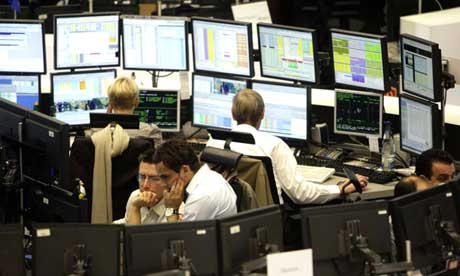Results 1 to 2 of 2
Thread Information
Users Browsing this Thread
There are currently 1 users browsing this thread. (0 members and 1 guests)
Threaded View
-
10-01-2008, 08:45 PM #1Senior Member


- Join Date
- May 2007
- Location
- South West Florida (Behind friendly lines but still in Occupied Territory)
- Posts
- 117,696
IMF adds to pressure on Congress to approve bail-out
IMF adds to pressure on Congress to approve bail-out
• FTSE 100 continues to bounce back
• Asian stocks also gain on deal optimism
Graeme Wearden and Andrew Clark in New York
guardian.co.uk,
Wednesday October 01 2008 13:30 BST

London and Asian shares have recouped some of their recent losses. Photograph: Alex Grimm/Reuters
The International Monetary Fund has added to the growing pressure on the US Congress to approve the Wall Street bail-out, as stockmarkets rose on optimism that a deal will be hammered out this week.
Dominique Strauss-Kahn, managing director of the IMF, warned last night that the US must take urgent steps to protect its economy from the ongoing financial crisis.
"We're right at the moment where action is needed," warned Strauss-Kahn. "A non-perfect plan is better than no plan at all," he added, in an interview with Reuters in Washington.
The prospect of a deal this week sent shares up in London, where the FTSE 100 continued yesterday's bounce-back. After leaping by 92 points in early trading it was up 82.5 at 4985 at 1.30pm. Asia was also more buoyant, where Japan's Nikkei recovered some of yesterday's heavy losses to close almost 1% higher. Hong Kong's Hang Seng index gained 0.75%.
But the Dow Jones industrial average is expected to fall by around 100 points when trading begins on Wall Street.
The House of Representatives sent shockwaves around the world on Monday when it voted down the $700bn (£390bn) rescue plan, under which the US government would cleanse the banking sector's balance sheets.
With politicians worldwide demanding action, the US Senate is due to buck convention and vote on an amended version of the rescue plan this evening – before the lower house has given its approval. In an effort to win Congress's backing, it now includes a clause to raise the government's guarantee on savings from $100,000 (£56,000) to $250,000.
But in a sign of the problems facing the financial industry, JP Morgan warned that Europe's banks will take fresh asset writedowns totalling €28.4bn (£22.5bn) before the end of this year.
The research note predicted the following writedowns:
• Lloyds TSB (including HBOS): £4.5bn
• Deutsche Bank: £3.6bn
• UBS : £2.1bn
• Barclays: £2.9bn
• Société Générale: £2.1bn
Strauss-Kahn demanded that Europe draw up contingency plans in case its own banking system needs to be rescued. Unlike in America, there is no single regulator overseeing the system.
"Developing a contingency plan does not mean it's announcing a lot of trouble coming. But they're not totally immune … and so they need to organize," he added.
But the president of the European Central Bank, Jean-Claude Trichet, has rejected the idea that Europe should organise its own bail-out.
"We are not a fully fledged federation with a federal budget," Trichet pointed out. "Each country has to mobilize its own efforts."
He also echoed calls for rapid action on the bail-out.
"It has to go, for the sake of the US and for the sake of global finance," Trichet said.
Both presidential candidates have also called for a new push to get the rescue plan through.
On the campaign trail yesterday, Barack Obama warned of "catastrophic" consequences unless a deal is reached soon.
"We cannot risk another week or another month where American businesses are afraid to extend credit and lend money," he said.
There was also renewed optimism on Wall Street that the treasury would eventually be able to hoover up "toxic" mortgage-related assets.
"Cooler heads are prevailing - we'd had a little bit of panic at the close yesterday," said Anthony Conroy, head trader at BNY ConvergEx in New York. "There's anticipation that some sort of deal will be passed by Congress in the next day or two."
The US public has blamed the shambolic handling of the bail-out plan on both Congress - whose approval rating has fallen to 10% - and president George Bush, who is accused of caring about "fat cats" rather than ordinary people.
http://www.guardian.co.uk/business/2008 ... .useconomyJoin our efforts to Secure America's Borders and End Illegal Immigration by Joining ALIPAC's E-Mail Alerts network (CLICK HERE)


 LinkBack URL
LinkBack URL About LinkBacks
About LinkBacks






 Reply With Quote
Reply With Quote

DHS says 'privacy' of migrants on terrorist watchlist is greater...
05-17-2024, 09:42 PM in illegal immigration News Stories & Reports